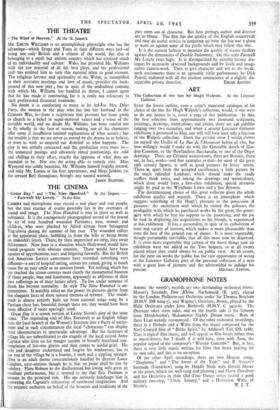THE CINEMA
CAMERA and microphone may record a real place and real people, but the true essence of events generally lies in the overtones of sound and image. The Nine Hundred is true in spirit as well as substance. It is the courageously photographed record of the rescue by air of nine hundred wounded Partisans ; men, women and children, who were plucked by Allied airmen from beleagured Yugdslavia during the summer of last year. The wounded collect at the appointed place, hobbling in from the hills or being borne on makeshift litters. There, by their improvised air-strip, they await deliverance. Now here is a situation which Hollywood would have found pregnant with obvious emotion. There would have been agonies of apprehension, tears and lingering farewells. But the British and American Service cameramen have recorded something very different—a sort of hospital outing, serious yet casual, giving as much cause for an easy smile as an anxious frown. Yet nothing which has yet reached the screen conveys more clearly the monumental heroism of these people, lean and handsome, apparently as oblivious of their past sufferings as of their future safety. To live under sentence of death has become normality. In style The Nine Hundred is un- pretentious. It sensibly relies on the power its pictures derive from the eloquent faces of these natural enemies of tyranny. The sound- track is almost entirely built up from national songs sung by a Partisan choir but, beautiful though these are, they would have_been more effective 'if more sparingly used.
Great Day is a screen version of Lesley Storm's play of the same name. - The impending visit of Mrs. Roosevelt to an English village puts the local branch of the Women's Institute into a flurry of excite- ment and in such circumstances the local "characters " can display their idiosyncracies to spectacular advantage. But the humours of village life are /subordinated to the tragedy of the local retired Army Captain who lives on his meagre income in bitterly frustrated con- templation of last-war glciries and then comes to sordid grief. His wife and daughter understand and forgive his weaknesses, but to the rest of the village he is a boaster, a snob and a tippling sponger. Here is an adult theme conscientiously handled by director Lance Comfort, over-anxious though he is that no point shall be lost by subtlety. Flora Robson as the disillusioned but loving wife gives an excellent performance, but it seemed to me that Eric Portman is miscast in the principal role. His age seriously handicaps him in conveying the Captain's exhaustion of spirits and imagination. And the neurotic outbursts on behalf of the beauties and -traditions of the past seem out of character. But here perhaps author and director are to blame. The film has the quality of the English countryside and may do useful service in conjuring up from the last war a ghost to warn us against some of the perils which may follow this one.
It is the current fashion to measure the quality of screen thrillers against the dimensions of Double Indemnity. On this scale Farewell My Lovely rates high. It is distinguished by suitably laconic dia- logue, by accurately observed• backgrounds and by lively and imagi- native camera-work. Then to give character and wit to the break- neck excitements there is an agreeably virile performance by Dick Powell, endowed with all the insolent omniscience of a slightly dis-


























 Previous page
Previous page